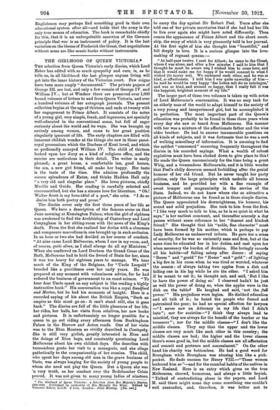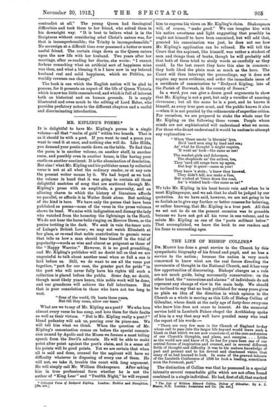THE GIRLHOOD OF QUEEN VICTORIA.* THE selection from Queen Victoria's
early diaries, which Lord Esher has edited with so much sympathy and care, is, as he tells us, in all likelihood the last glimpse anyone living will get into the inner history of the Victorian court. Few reigns have been more amply "documented." The private papers of George III, are lost, and only a few remain of George IV. and William IV.; but at Windsor there are preserved over 1,000 bound volumes of letters to and from Queen Victoria, and over a hundred volumes of her autograph journals. The present collection begins at the age of thirteen and ends at twenty with her engagement to Prince Albert. It consists of the notes of a young girl, very simple, frank, and ingenuous, not specially well-educated in the conventional sense, but full of eager curiosity about the world and its ways. She was brought up entirely among women, and came to her great position singularly ignorant of life. The early chapters are filled with innocent childish wonder at the things she saw in those quasi- royal processions which the Duchess of Kent loved, and which so profoundly annoyed William IV. The child of thirteen looked upon her diary as a kind of religious office, and the entries are meticulous in their detail. The writer is easily pleased; a great house, a comfortable inn, good horses, the sea, a new girl friend, all make her happy. Her taste is the taste of the time. She admires profoundly the rococo splendours of Eaton, and thinks Haddon Hall only "a very old and singular place." She loves pictures, chiefly Murillo and Guido. Her reading is carefully selected and circumscribed, but she has a sincere love for literature. "Oh! Walter Scott is my beau-ideal of a poet," she cries. "I do so dmire him both poetry and prose."
The diaries cover only the first three years of her life as Queen. We have a description of the famous scene on that June morning at Kensington Palace, when the girl of eighteen was awakened to find the Archbishop of Canterbury and Lord Conyngham in her sitting-room with the news of the King's death. From the first she realized her duties with a clearness and composure marvellous in one brought up in such seclusion. In an hour or two she had decided on her course of conduct. "At nine came Lord Melbourne, whom I saw in my room, and, of course, quite alone, as I shall always do all my Ministers.' When she conferred on Lord Durham the Grand Cross of the Bath, Melbourne had to hold the Sword of State for her, since it was too heavy for eighteen years to manage. We hear much of the King of the Belgians, for "Uncle Leopold" brooded like a providence over her early years. He was prepared at any moment with voluminous advice, for he had reduced the business of government to an exact science. "To hear dear Uncle speak on any subject is like reading a highly instructive book." His conversation was like a royal Sandford and Merton, but he had his moments of insight. Here is a recorded saying of his about the British Empire, "Such an empire as this must go on : it can't stand still, else it goes back." The diaries are full of the little pleasures of her life, her rides, her balls, her visits from relatives, her new books and pictures. It is unfortunately no longer possible for a queen to go out riding every afternoon from Buckingham Palace in the Harrow and Acton roads. One of her visits was to the Eton Montem so vividly described in Coningsby. She is still very girlish, greatly interested in Eton and the doings of Eton boys, and constantly questioning Lord Melbourne about his own childish days. She describes with tremendous gusto her visit to a menagerie, and she clings pathetically to the companionship of her cousins. The child, who spent her days among old men in the grave business of State, was always longing for the society of young people to whom she need not play the Queen. But a Queen she was 'n very truth, as her conduct over the Bedchamber Crisis proved. It was not given to many young ladies of nineteen
The Girlhood of Queen Victoria a Selection from Her Majesty's Diaries, 1832-1840. Published by authority of His Majesty the King. Edited by Viscount Esher, G.C.B. 2 vols. London John Murray. [36s. net.]
to carry the day against Sir Robert Peel. Years after she told one of her private secretaries that if she bad had her life to live over again she might have acted differently. Then comes the appearance of Prince Albert and the short court- ship, the story of which is very pleasantly told in her journal.
At the first sight of him she thought him "beautiful," and fell deeply in love. It is a curious glimpse into the love- making of regnant queens :—
" half-past twelve I sent for Albert; he came to the Closet, where I was alone, and after a few minutes I said to him that I thought he must be aware why I wished him to come here, and that it would make me too happy if he would consent to what I wished (to marry me). We embraced each other, and he was so kind, so affectionate. I told him I was quite unworthy of him— he said he would be very happy 'dm Leben mit dir zu zubringen: and was so kind, and seemed so happy, that I really felt it was the happiest, brightest moment of my life."
The larger part of these two volumes is taken up with notes of Lord Melbourne's conversation. It was no easy task for an elderly man of the world to adapt himself to the society of a very young and inexperienced girl, but he accomplished it to perfection. The most important part of the Queen's education was probably to be found in these three years when every day she saw or heard from Melbourne. His manner with her was a mixture of the affectionate father and the wise elder brother. He had to answer innumerable questions on all kinds of subjects, and it was fortunate that he was a sort of walking miscellany of information. It is amusing to find the epithet "consumed" occurring frequently throughout the diaries in his recorded sayings. What a wealth of robust expletives must have been choked down to give place to this He made the Queen unconsciously for the time being a great Whig, and a tremendous Melbournite, and it is little wonder that Peel's chilly decorum seemed forbidding after the genial humour of her old friend. But he never taught her party politics, only the large principles which underlie all human business, and he provided her with a fine example of sweet temper and magnanimity in the service of the State. Indeed, we do not know where else so attractive a picture of Melbourne can be found as in these simple diaries. The Queen appreciated his downrightness, his humour, his sound and solid prejudices. She took to him from the first. "I like very much to talk to him, as he is so quiet in what he says," is her earliest comment, and thereafter scarcely a day passes without some reference to her "dearest and kindest friend." She thought that his "noble, fine character" must have been formed by his mother, which is perhaps to pay Lady Melbourne an undeserved tribute. He gave her a sense of security, for he was so eminently sane and firm, but at the same time he educated her in her duties, and cast upon her when necessary the burden of decision. She lovingly records all his habits—of falling asleep after dinner : of saying "Room" and " goold " for " Rome " and " gold ": of lighting a big fire in his room when he was tired or worried, whatever the season : of always taking two apples from a dish and hiding one in his lap while he ate the other. "I asked him if he meant to eat it; he thought not, and said, 'But I like to have the power of doing so.' I observed hadn't he just as well the power of doing so, when the apples were in the dish on the table? He laughed and said, 'not the full power.'" His prejudices were legion. He disliked education and all talk of it ; he hated the people who fussed and patronized the poor; he had no special affection for lawyers —"I never saw an Attorney in my life that I didn't hate"; nor for societies—" I think they always lead to mischief, they are always for the benefit of the banker or the treasurer " ; nor for the middle classes—" I don't like the middle classes. They say that the upper and the lower classes are very much like each other in this country; the middle classes are bad; the higher and the lower classes there's some good in, but the middle classes are all affectation and conceit and pretence and concealment." On the other hand bis charity was bottomless. He had a good word for Brougham while Brougham was abusing him like a pick- pocket. He finds excuses for Henry VIII.—" These women bothered him so "—and for the cannibal habits of the natives in New Zealand. Here is an entry which gives us the true Melbourne, shrewd, humorous, and always a little boyish.
"Talked of contradicting abuse in the papers, and Lord M. said there might some day come something one couldn't well contradict, and, therefore, it was better not to contradict at all." The young Queen had theological difficulties and took them to her friend, who solved them in his downright way. "It is best to believe what is in the Scriptures without considering what Christ's nature was, for that is incomprehensible; the Trinity is incomprehensible." No sovereign at a difficult time ever possessed a better or more useful friend. The curtain rings down as the Queen enters upon the new life with her husband. Two years after her marriage, after re-reading her diaries, she wrote: "I cannot forbear remarking what an artificial sort of happiness mine was then, and what a blessing it is I have now in my beloved husband real and solid happiness, which no Politics, no worldly reverses can change," The book is one which the English nation will be glad to possess, for it presents an aspect of the life of Queen Victoria which is now too little remembered, and which is full of interest both on historical and on human grounds. It is amply illustrated and owes much to the editing of Lord Esher, who provides prefatory notes to the different chapters and a useful and discriminating introduction.



















































 Previous page
Previous page